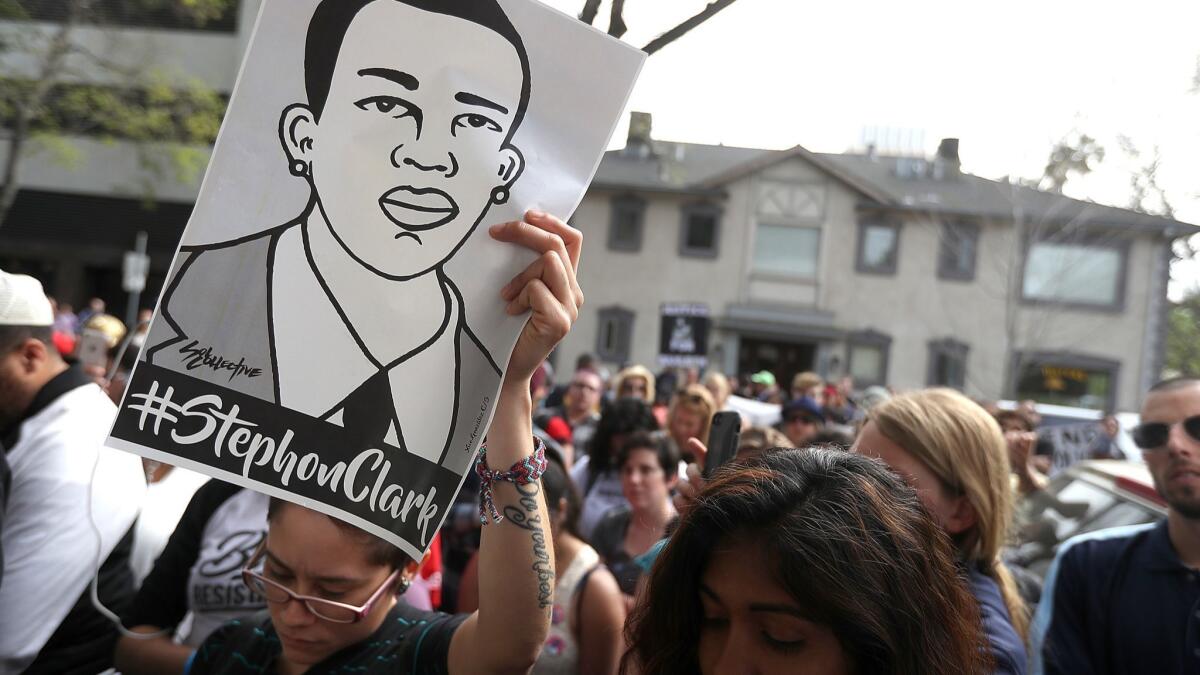Newsletter: After Stephon Clark, will good cops finally have had enough?

- Share via
Good morning. I’m Paul Thornton, and it is Saturday, April 7, 2018. Happy 49th birthday, internet. Let’s take a look back at the week in Opinion.
A young black man is in his own yard when police confront him. Frightened, he reaches for his waistband for what appears to be a gun, and police, fearing the worst, fire more than a dozen rounds. He dies, and police only later discover that he hadn’t been carrying a weapon.
Stephon Clark, Sacramento, 2018? No — Jerry Lee Amie, Los Angeles, 1970, and police made up that story about mental illness. Amie was also a Purple Heart recipient who had been honorably discharged from the military, and his family members say police made up the story about him reaching for something that looked like a gun.
And what we’re hearing now about Clark — that he was a thug who foolishly resisted arrest — is the same kind of postmortem smearing endured by the families of Amie and countless other people of color who have been unjustly killed by police. The killing, and the smearing, has to stop, writes Gustavo Arellano:
Will the officers who killed Clark be charged? We still don't know. We do know that Clark's death shows us that we're no closer to having the police take honest responsibility for shootings than we were when Amie was killed in 1970....
Clark's supporters, however, have tools to seek justice that the families of Amie and Alexander never had. Police body camera video and helicopter coverage of his death exist. California Atty. Gen. Xavier Becerra has offered an independent review. There is a critical mass of activists who don't just march with signs, but show up in the courtrooms and during city council meetings as the world watches. Enough, they say. Enough.
Police and their supporters will do what they've always done, which is to dismiss critics as radicals who don't understand the thin blue line. Enough excuses. Right now, it's on law enforcement to show the rest of us that they truly want to protect and serve, not shoot first and dare to proclaim themselves victims after. Enough, they need to say. Enough.
Clark’s death exposes California’s shameful secret: Despite our liberal reputation, this is a state where black residents are over-policed, subject to much higher rates of officer-involved shootings and traffic stops, and have incomes dramatically lower than other ethnic groups. “California emits a golden halo in the progressive American imagination, one that obscures the material conditions of blacks in the state,” writes journalist Amy Alexander. “I think it is fair to ask if this partly allows elected officials to avoid grappling directly with blacks’ disparate treatment.” New York Times
Governments don’t have to be the only immigrant “sanctuaries.” In fact, across California, many institutions of everyday life — churches, schools, restaurants and more — are taking active steps to prevent the immigrants in their communities from being deported. Those efforts, write law professors Pratheepan Gulasekaram and Rose Cuison Villazor, include providing shelter and legal assistance and even preventing federal immigration agents from inspecting private businesses. L.A. Times
If L.A. can take on the gun lobby, why can’t it stand up to the opponents of “road diets”? Last year, 239 people in Los Angeles were killed in gun homicides, so of course City Hall is right to antagonize the National Rifle Assn. That same year, 244 people were killed in city traffic, and yet our leaders kowtowed to vocal automobile activists who’d rather be allowed to continue driving fast than have our streets reworked to slow down cars and improve safety. L.A. Times
President Trump does not know what a community college is. He said so himself — “I don’t know what that means, a community college” — in a jab at the massive educational systems in each state that will serve as a crucial component of the president’s own promise to put more Americans back to work. “For America to expand its economic prosperity, the White House needs to work to strengthen community colleges,” writes California Community Colleges Chancellor Eloy Ortiz Oakley. “Instead, the president proposed cuts to workforce training and education programs.” L.A. Times
He was there with the Rev. Martin Luther King Jr., when both men were in their 20s and budding civil rights activists, when King delivered his eerily prescient “Mountaintop” speech on April 3, 1968, and in Memphis a day later when King was assassinated. Today, James Lawson — who at 89 still teaches at Cal State Northridge and lectures on activism and nonviolence — thinks about modern racial justice movements such as Black Lives Matter (he believes they do not understand how to change white power brokers’ minds) and the few people today who he believes most embody King’s leadership qualities. L.A. Times
Reach me: paul.thornton@latimes.com
